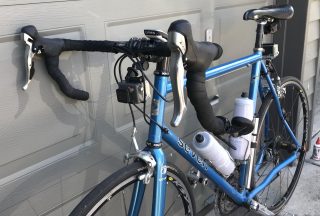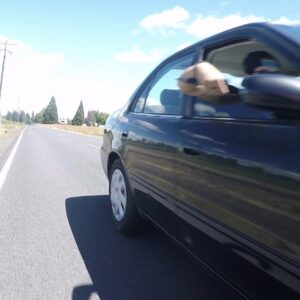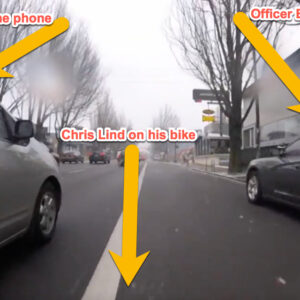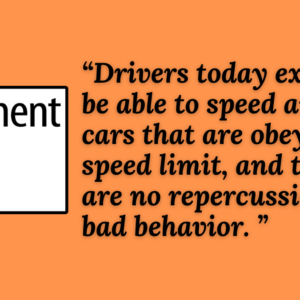“When he slowed the video down, Hank was shocked to see that the vehicle’s passenger held a knife in his outstretched hand.”
This post by lawyers Chris Thomas and Ray Thomas is part of a paid promotional partnership with Thomas, Coon, Newton & Frost.
Sometimes video evidence is essential to holding dangerous road users accountable. The case of our client Hank Bosak illustrates this well.
Installing the camera system on his bike in 2017 helped ease the anxiety he felt when riding.
On June 22, 2019, Hank Bosak, a 60-year-old mechanical engineer, prepared to go for a Saturday afternoon bike ride in rural Washington County. As was his custom for the past few years, he turned on the front and rear video cameras he had installed on his bike.
In 2004, Hank was hit on a rural, Washington County road by a driver who fled the scene, leaving him with multiple fractures on the side of the road. The sudden nature of that collision, and Hank’s injuries, prevented him from obtaining the license plate or other information to identify the hit and run vehicle. Since that time, Hank has felt anxious about riding on the beautiful, low traffic rural roads near his home, and often felt a sense of impending danger from the sound of overtaking traffic.
Installing the camera system on his bike in 2017 helped ease the anxiety he felt when riding.
As Hank pedaled along Hornecker Road on that June afternoon by himself, at about mile 3 of a 30 mile ride, he was passed at high speed and at a distance significantly below the “fallover distance” required under Oregon law (ORS 811.065).
Here is how the pass appeared in real time to Hank’s rear-facing camera:
And here is the real time pass from Hank’s forward-facing camera:
Thankfully, Hank’s rear-view mirror allowed him to view the car as it approached and prepare for the close pass. Shaken, but uninjured, Hank finished his ride without incident, wondering why the car had passed him so closely, particularly in the absence of any oncoming traffic. When he arrived at home, he decided to revisit the incident and planned to report the illegal pass to police. When he slowed the video down, Hank was shocked to see that, not only had he been passed dangerously closely, but the vehicle’s passenger held a knife in his outstretched hand, shown here:
(Photos: Thomas, Coon, Newton & Frost)
Thanks to the information captured on Hank’s camera system, including the vehicle’s license plate, the story attracted the attention of local media and law enforcement, ultimately resulting in criminal conviction of the passenger for Felony Unlawful Use of a Weapon and Misdemeanor Recklessly Endangering Another Person.
Hank’s diligent use of cameras allowed him to capture both the dangerously close pass and the extraordinary criminal activity of the vehicle occupants. As an engineer, Hank has a helpful technical background that allowed him to set up and maintain his camera system. Below, we share the details of Hank’s system, which may provide folks curious about riding with cameras with a useful guide on how to do it. Perhaps if enough bicyclists use cameras, and use them to hold dangerous road users accountable, a deterrent effect will develop on the roadway similar to red light and speed cameras, premises security cameras, and other surveillance tools.
Hank’s Camera System
Hank’s system consists of two GoPro cameras. His are the Hero 4 model, which can be found online for about $100 each. The current model, the Hero 7, runs about $200. Other, less expensive options are available, and Hank found that resolution of at least 1080 pixels is needed to make out a license plate number on a speeding vehicle. GoPro or generic mounts for the front handlebars and seat post or frame seat stay cost about $30 each.
Hank used SD memory cards in each camera with 32 GB of storage, which cost less than $10 each and record about two hours of riding. Hank also outfitted each camera with a supplemental battery, made by BacPac for about $50 each, to provide enough recording time for his customary two hour ride. While lower resolution cameras use less energy, Hank has found that the sharp image his cameras provide warrant the additional energy use.
A comparable camera, including the extended battery and case, is shown here:
In total, one of Hank’s units costs between $190 and $290.
After each ride, Hank plugs in his batteries to the charger, and, if nothing eventful occurred on the ride, he pushes a button on each camera that deletes its memory card.
For those who lack Hank’s technical background, once the above components are obtained, a local bike shop should be able to help assemble and install them (Olson’s Bicycles in Forest Grove charges about $40 in labor).
Although it carries significant up-front cost, your system only needs to work once to make it all worthwhile.
As lawyers, video evidence can provide strong, irrefutable evidence supporting our clients’ claims for damages resulting from dangerous behavior by road users. While we wish taking such measures was not necessary, we hope this article helps you find peace of mind whether you ever need the footage or not.
— by Ray Thomas and Chris Thomas
— Get our headlines delivered to your inbox.
— Support this independent community media outlet with a one-time contribution or monthly subscription.












Thanks for reading.
BikePortland has served this community with independent community journalism since 2005. We rely on subscriptions from readers like you to survive. Your financial support is vital in keeping this valuable resource alive and well.
Please subscribe today to strengthen and expand our work.
I ride with a camera pretty much every single ride, mostly because I like watching where I’ve been, and sometimes I put together a video of the ride with a map and other stats such as distance ridden and current speed. The side benefit of course is if I were to ever get into a collision or witness another reckless driver out there, the cameras would prove invaluable.
Luckily all I’ve captured so far are a few red light runners and drivers who failed (or almost failed) to yield. I don’t ever wish for a collision or a confrontation, but if it did happen, I’d be prepared. I’m thinking soon I should upgrade my camera and use my current one to capture rearview footage.
Chris, my experience is that the PPB won’t pursue charges against a perpetrator based solely on a license plate. I am speaking specifically of an incident I captured with an on-bike camera. Why is that? This appears to me to be a demonstration of PPB bias against cyclists. Maybe I’m wrong. I still use a camera though.
This is something I learned many years ago when trying to get people busted for DUI: a license plate alone is not enough because it only identifies a vehicle. Crimes aren’t committed by vehicles, they are committed by people. If you can’t identify the person behind the wheel, you have nothing.
Without positive identification of the actual driver, accusing the owner of the vehicle will not pass the “beyond a reasonable doubt” standard in court. You’ve got to establish that they were behind the wheel, and not their buddy, or their spouse, or one of their kids.
If your camera is good enough – and the lighting is good enough – to catch an image of the driver as well as the license plate, then you might have something.
That is the point I’m making as well. Also, there’s a tremendous dead zone of data collection before the data is useful. In other words, the circumstances need to be exceptional for the video footage to be evidence of a crime. This lesson was for me a bitter pill to swallow. I still can’t get over it. I believe the vehicle owner is at fault for any actions an operator carries out. If I loan my car to someone, I take responsibility for considering their ability to use it wisely. I mean, I wouldn’t loan a firearm to someone without first asking, “will they be safe”. So, why are motor vehicles any different? Because we treat motor vehicles like a fashion accessory.
Why are motor vehicles different than firearms? I don’t think they are (at least in the respect we’re discussing). I am not guilty murder if loan my Smith & Wesson hand ejector .44 special caliber pearl handled nickel plated revolver to someone else who uses it to kill, even if the police aren’t sure who the shooter was.
If the driver cannot be identified then the owner should get a large fine. Just like a parking ticket, you don’t need a driver to be there to fine the owner for something done illegally with the vehicle.
And the owner should be required to provide the name of the driver or face an obstruction of justice charge.
So they either fess up to it and go through the usual process, or they don’t fess up and they get a huge fine and go through the court with an obstruction charge.
I don’t know why we’re not already doing these things.
Sure, fines can be assessed on the owner of a vehicle.
But a fine is not a criminal conviction. To convict a person of a crime, it’s pretty much constitutional bedrock that you have to prove that they personally did it. I don’t think you have a chance of getting the constitution changed over this, if we can’t even get the ERA passed.
It would be obvious to the court that the owner of the vehicle knows who was driving their vehicle. So, if they called the owner into court and required that they identify the driver, it would be illegal for them not to provide the person’s identity. Otherwise, they would be in obstruction of justice and face jail time. No constitutional changes are necesary.
“It would be obvious to the court that the owner of the vehicle knows who was driving their vehicle. So, if they called the owner into court and required that they identify the driver, it would be illegal for them not to provide the person’s identity. Otherwise, they would be in obstruction of justice and face jail time. No constitutional changes are necesary [sic].”
It’s not like that at all.
While I agree with that notion, the presumption of innocence contradicts that statement. Who knows if the car was stole, borrowed without permission or borrowed under duress? The DA wont take it.
Although, cameras do provide supporting evidence, they do not act as primary evidence. And if you don’t believe me, call the PPB and tell them you got video of road rage, but only got the license plate.
“So, if they called the owner into court and required that they identify the driver, it would be illegal for them not to provide the person’s identity.”
Sounds like a subpoena, which can be issued today. No law change necessary.
That’s true, and it depends on the order of actions. If you try to go through the cops, you’ll get stonewalled – they won’t follow through and press charges. If however, you go through a lawyer, it’s a different story. So, if the court case is predicated on police action, my statement is valid. I think most people would try to press charges before going to a lawyer, but that’s just because I think lawyers are expensive.
I think every cyclist in Portland needs to buy a bike camera or two. I have the Cycliq Fly6/12 front and back combo with integrated lights. What’s nice about these cameras is that they automatically overwrite what’s recorded unless the bicycle fell over while they were recording; or if you pushed the snapshot button.
Two years ago I was doored by a student driver sitting in a parked car with his friends. He was acting a tad aloof after I picked myself up off the ground. He didn’t ask me if I was OK, and when I asked him for his insurance information, he claimed that it wasn’t in the car. I asked him to check the glove box, where everyone keeps their insurance info, and he found it immediately.
Despite that behavior, I didn’t suspect anything nefarious from him. Unfortunately, a couple days later I was feeling really bad, so I opened an insurance claim to pay my medical costs with Geico, his insurance company. They told that they wouldn’t agree to pay anything until they talked to their driver. I waited about a week and then I decided that I need medical treatment so I paid out of pocket for my medical expenses.
Well the driver dodged Geico’s calls for a month, and then when they finally got a hold of him, he claimed I came out of nowhere and slammed into his car, and that the accident was entirely my fault.
So they sent me an email saying that they had closed my claim without talking to me or my insurance company. I called them immediately to hear why, and that’s when I heard the story their driver gave them. I laughed really loudly after the insurance agent was done explaining their decision. I told him that I had already told both him, and my own insurance agent, that I had two witnesses, and it was obvious that he hadn’t contacted either witness. He said he’d get back to me.
After calling the first witness, the agent called me back and said Geico would cover my medical expenses and pay me for pain and suffering.
What I learned from all of this:
1. Ride with cameras, because people will lie to get out of paying your medical bills for an accident that they caused.
2. Pay for the uninsured motorist insurance (UMI?) and Personal Injury Protection (PIP) add-ons for any vehicle you own, because it also covers you as a pedestrian and cyclist.
Cameras are a great idea. I think there should also be a clearinghouse where you can send your video for safekeeping that the police and the public can access. Furthermore, insurance companies should be required to view videos when one of their insured vehicles was involved, whether or not charges or claims are filed. Right now, the state doesn’t seem to keep a database of vehicles and their insurers; we need to fix that for several reasons.
Referencing back to Carlin’s experience, and on the topic of insurance companies- NEVER accept what they say when it comes to claims. They are not interested in what the law is, and they are not interested in justice. They are only interested in paying out as little as possible, preferably zero. Expect to have to force them into doing what’s right, they will NOT do it otherwise. Videos, witnesses, and threats about lawyers are all very helpful. If they know they’re cornered, they’ll pay. If they think they can weasel or wait it out, they will. Don’t ever expect them to do the right thing voluntarily.
Yeah, cameras… cameras everywhere (meme.gif). I honestly think that every cyclist should have cameras, despite their limitations.
Sucks to get doored man. I was heckled by another cyclist once for “riding in the middle of the road”. Well, check this video for door zone. Most people ride way to close to cars. https://www.youtube.com/watch?v=vlOnnDvr9Uw
Good tip on self insurance, another mate of mine was right hooked and his own insurance carried him through. The motorist wasn’t even insured!
I’m amazed at the image quality here. I’ve looked into getting a camera setup too, but always balked at the GoPro setup because despite all the improvements in miniaturization, those things remain so danged big.
Actually I haven’t given a camera much thought since I moved to Minneapolis, since drivers are a little less hostile towards cyclists there (though, oddly, they are vastly more indifferent and dangerous towards pedestrians). But I’m in the Portland area riding my bike around this week, and definitely having cars come a little too close more often than I like. Either way, this is a good reminder that it only takes one.
Questions about the conviction:
– What was the sentencing (if it’s been done yet)? I’d be very interested to know how long this guy gets removed from society, if at all.
– Why aren’t we naming the perp? Now that there’s a conviction, it is public record.
I agree with both of GlowBoy’s questions. Am curious too.
Cristian Garcia-Garcia (the passenger) was sentenced to 90 days in jail and 3 years of probation. I am not aware of the status of criminal charges against the driver.
Nice set up on a nice bike.
Another option I’ve looked at before…
https://cycliq.com/
Have these, like these. Much more of a dash cam than action camera though. The original fly12 is good enough quality I would recommend but for the 6 I suggest getting the CE as the originals video quality is quite poor.
An easier option for those less technically-minded are the Fly6 and Fly12 rear and front camera/light combos from CycliqPlus (cycliq.com)
Seems like the driver should face charges or a ticket as well, if not for participating at least for the dangerous pass.
I had a positive experience submitting an ORS 811.065 video to PPB via an email to city council requesting enforcement. It was in the Lloyd about a year ago and I had the chance to see the guys face at the time, so I could positively ID.
Ofc Byrd ran the plate and we reached an amicable resolution. It will not work every time, but IMO you absolutely _should_ take video (if you’re up for it, it’s a PITA) and _ask for enforcement_. It helps. If you want to take video, the best setup I have found is the Cycliq integrated camera / lights (front and rear.)
Camera footage of just a vehicle is not always useful to convict someone, but is still often useful. I ride in the east coast Portland area, and I hooked up a camera after one driver was reliably hassling me everyday with close passes, engine revving, etc. Once I had a nice compilation I sent it off to the police and they were very helpful in that they contacted the owner and explained to them the rules of the road. I was told the driver was not happy about it, but in the future they passed me without hassle.
I pass through three towns on my ride to work and response will vary based on police department and even on officer. Sometimes I hear back right away, sometimes I don’t hear back at all. Usually, the video results in a call to the driver. Once, an officer went to the driver’s house to show them the video and admonish them! I’ve never had anyone convicted (that I know of) but I feel I’m making the roads safer for me and others with these warnings.
Footage is also useful when it comes to commercial vehicles. It’s easy to find contact info and send the video to a safety or feedback department. Bigger companies especially have a process for taking and reviewing complaints. On a recent video of a FedEx driver, the video was viewed by them dozens of times so I knew at least something was happening internally there (I keep videos unlisted at first so I can see if they are viewed by the company/police).
I do try to post fun or interesting videos as well so it is not all just bad behavior!
Finally, there is a chance to earn a little money if a video goes viral or is licensed. I had two of my videos licensed (one of me being hit by a truck, one of a person yelling) and even though my channel is not popular at all I’ve made just enough money from that to break even on the cost of the most recent camera (GoPro 7).
My username is “Spacebike” on YouTube if you want to see examples.
https://www.youtube.com/channel/UCkUFv3WgVskOSttzhUCrn9w
“I ride in the east coast Portland area…”
Are you talking about Portland, Maine?
Yes, sorry, that is what I meant to say!
Took a look at your videos. Lots of snow! And crappity drivers.